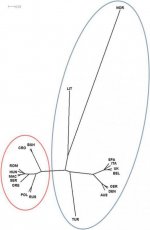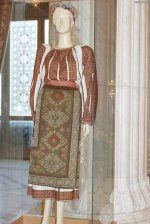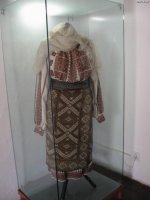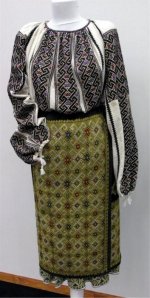Diurpaneus
Banned
- Messages
- 249
- Reaction score
- 21
- Points
- 0
- Location
- Bărăgan
- Ethnic group
- Thraco-Roman
- Y-DNA haplogroup
- Argeș(~SER+MAC)
- mtDNA haplogroup
- Walati(Vlachs)
Who Am I?
I am this tone named Alexandru.
The emperor did not relent, but every year he marched into Bulgaria and laid
waste and ravaged all before him. Samuel was not able to resist openly, nor to
face the emperor in open warfare, so, weakened from all sides, he came down
from his lofty lair to fortify the entrance to Bulgaria with ditches and fences.
Knowing that the emperor always made his incursions through the
known as [B][SIZE=4]Campu Lungu[/SIZE][/B] and [the pass known as] Kleidion (‘the key’), he undertook
to fortify the difficult terrain to deny the emperor access. A wall was built
across the whole width [of the pass] and worthy defenders were committed to
it to stand against the emperor.When he arrived and made an attempt to enter
[Bulgaria], the guards defended the wall manfully and bombarded and
wounded the attackers from above. When the emperor had thus despaired of
gaining passage, Nicephorus Xiphias, the strategos of Philippopolis,met with the
emperor and urged him to stay put and continue to assault the wall, while, as
he explained, he turned back with his men and, heading round to the south of
Kleidion through rough and trackless country, crossed the very high mountain
known as Belasica. On July, in the twelfth indiction [, Xiphias and his
men] descended suddenly on the Bulgarians, from behind and screaming battle
cries. Panic stricken by the sudden assault [the Bulgarians] turned to flee, while
the emperor broke through the abandoned wall. Many [Bulgarians] fell and
many more were captured; Samuel barely escaped from danger with the aid of
his son, who fought nobly against his attackers, placed him on a horse, and
made for the fortress known as Prilep"
(Byzantium's Balkan Frontier)
[COLOR=#000000]"Basil II was defeated by Samuel at a pass called Kimba Longus or Kleidion which is almost surely the equivalent of the Rumanian Campulung (Campus longus), a frequently-used place name."
[/COLOR]http://www.kroraina.com/bulgar/wolff_appA.html
Traditional costumes from Arges(unique in Romania):
[ATTACH=CONFIG]7930[/ATTACH]
[ATTACH=CONFIG]7931[/ATTACH]
[ATTACH=CONFIG]7932[/ATTACH]
Macedonian costumes:
[ATTACH=CONFIG]7933[/ATTACH][/QUOTE]
Argea is an Old Macedonian(Alexander's speech) term ,integrated
into the Latin of Romanian type,while the Albanian ragal/argal comes
from the Greek argaleios.
intervocalic"-ll-" dissapears
Latin stella Romanian stea
Latin hirundinella Romanian randunea
"Romanian argea ‘subterranean room’ has been considered Thraco-Dacian since Hasdeu
(Col. lui Traian, 232, 1873) from a Dacian *argilla and later in Etymologicum…
is associated with Greek άργιλλα ‘subterranean house’,[B] Old Macedonian árgella ‘id’[/B]
and Cimmerian argill ‘id’. This hypothesis was adopted also by Gr. Brâncuş
(VALR, 30) and I .I. Russu (Elemente, 133). All these forms are
derived from PIE *areg-to enclose"(INTRODUCTION TO THE ETYMOLOGICAL DICTIONARY
OF THE ROMANIAN LANGUAGE)
"ragal (Albanian) Origin & history Methatesized form of earlier *argal,
close to Romanian argea ("shed") and [B]Ancient Macedonian ἄργελλα 'Macedonian baths[/B]
[URL]http://www.wordsense.eu/argea/[/URL]
[URL]https://en.wiktionary.org/wiki/argea[/URL]
[URL]https://en.wikipedia.org/wiki/Arge%C8%99_County[/URL]
[URL]https://en.wikipedia.org/wiki/C%C3%A2mpulung[/URL]
EDIT:
I have found my horse.
EDIT:
This is an original post,like most of mine;
it is also a correct one,because that's what
the very smart people usually do.
I have emphasized the nature of the connection between the
Romanian and Macedonian terms,if I remember the copy-paste
or Google Search doesn't do that.
This happen to be an easy one,but in order to grow in complexity,
you have to have access to certain information.
In general,you can reach to the same conclusion with others,without being
guilty of plagiarism.
EDIT:
"Argella"/"argea" had widened its semantics, gaining the sense of "loom", possibly through
contact with the Greek or Albanian terms.
EDIT:
Despite the form of the PIE root(-areg;to enclose) from where the word argella is
coming,the river Arges can have "Macedonian" phonetics,if it
originally meant"The Enclosed River"="The River with High Banks".
The argument that favors the ancient origin of his name is Burebista's
capital,Argedava.
But the similarities might be visible also in meanings,with an
independent Macedonian-Getic-Thracian semantic development,
because Arges is a river,the Macedonian argella also denotes the "bath"and
Albanian "argesh", the "raft".
argesh m ‘crude raft supported by skin bladders, crude bridge of crossbars,
harrow
[URL]https://en.wikipedia.org/wiki/Argedava[/URL]
EDIT
We can make further independent semantical connections, the Macedonian, Greek and Romanian meaning of argilla/argella/argea,
"subterranean(house)", with the river Arges, that would have been "The Deep River","The River with a Deep Bed" or just the
concept of a river as simply the bed(river-bed-deepness).
A similar pattern exists in Romania,where alot of villages are called "Adancata"("The Deep Village",
adanc came from Latin aduncus),the one from Ialomita situated for sure at a confluence,certifying thus,the place name Argedava.
The Albanian term argesh can also be involved,because any raft sinks to a certain degree, the Thracian argilos(mouse;underground
animal) or the Macedonian bath, argella.
[URL]http://thevore.com/thracian/[/URL]
[URL]https://ro.wikipedia.org/wiki/Comuna_Ad%C3%A2ncata,_Ialomi%C8%9Ba[/URL]
[URL]https://ro.wikipedia.org/wiki/Comuna_Ad%C3%A2ncata,_Suceava[/URL]
The semantics of the river Arges resumes to the basis of the above-related terms:deepness and water.
Last edited:





